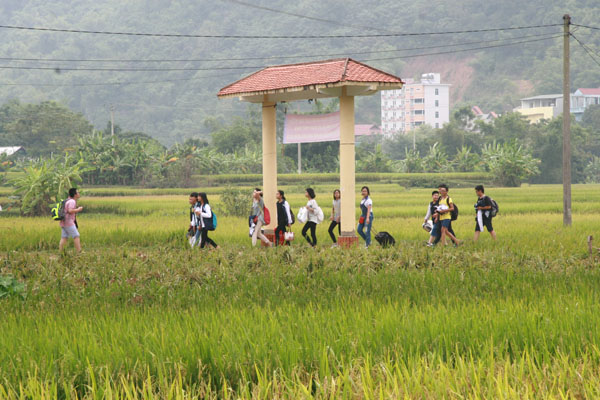
(HBO) –The bus runs from Hanoi along Road No. 6 north-westward to HoaBinh, the city of electricity and culture of different ethnic groups like Muong, Thai, Kinh, Dao, Mong and Tay. After passing Cunslope, the bus will reach the VuonhoanuiCoi (Coi Mount Flower Garden) cultural area in Cao Phong district, which is famous for its oranges and sugar-canes. Tourists should stop at the top of ThungKhePass to take a view of MaiChau Valley.

The
valley houses villages of ethnic groups in Mai Chauwith green rice and corn
fields under the mountain’s silhouette. There are stilt houses sitting at the
foot of the mountain and treesalong Xia Spring.
The valley is surrounded by high mountain ranges
which now appear, now disappear among clouds.
Arriving in Van and PomCoong villages in Mai
Chau town, Lac village in ChiengChau commune and Buoc village in XamKhoe
commune, visitors will be welcomed by local boys and girls in festive
clothes.
Local girls or owners of villages and families
will invite tourists to admire Thai people’s wide, clean and airy stilt houses
which are built from wood and bamboo. The houses have stairs at the two sides
and a vast shady space below. Surrounded by orchards, the houses boast a simple
but special beauty.
Visitors will be served with special local
dishes like Com lam muoivung (steamed sticky ricein bamboo tubes with sesame
and salt), Cha mianuong (roasted meat with sugarcane), barbecued or boiled pork
with Thai pepper, mountain chicken, multi-colour sticky rice, fish grilled in
banana leaves, wild bees, ant eggs, forest bamboo shoots and Mai Ha wine.
Vacationers can travel around villages,
mountains, forests and beautiful caves such as Nuoc, Khoai, Mo Luong, Chieu and
PiengKiem, and archeological sites like Long and KhauPhuc caves, along with
other national relic sites.
When it gets dark and cold, tourists are invited
to join a camp-fire organised at the courtyard of the cultural house and enjoy
traditional art performances. Local girls, boys and children amorously play
pan-pipes, gourd lutes, double flutes and gongs. Holiday-makers also have a
chance to enjoy traditional dances like sap, kengloong, nhumhua, khan (scarf),
quat(fan), kepbooc, ong (pipe) and ton coog.
Tours are available for those who are interested
in exploring the life of Mong people and their traditional culture in Pa Co and
Hang Kia communes, which are located
1,288 m above the sea level, with a pitch of
30-35 degrees.
Roofed with woodor thatch, Mong people’s houses
have gardens surrounded by stone walls. In the spring, Mong villages will be
covered by apricot, peach, plum and Ban flowers.
Locals exchange greetings on the way to the
market with dances and sounds of pan-pines and lip lutes.
The crowded and special village fair offers
visitors wine and "thang co” (horse meat soup). Old people come to the market
regularly to meet their old friends. It is a really an interesting place for
visitors to experience the local life.
Bui Chi
Thanh
A diverse chain of eco-tourism and resort destinations concentrated in Hoa Binh city and the districts of Tan Lac, Da Bac, and Luong Son… Along with the launch of several key high-quality resort tourism projects, these developments have reshaped the landscape and enhanced the appeal of Hoa Binh as a travel destination.
Boasting diverse terrain, a mild climate, and rich natural resources, Cao Phong district is increasingly asserting its place on Vietnam’s tourism map, attracting both domestic and foreign visitors. The district is renowned for its stunning landscapes, majestic mountains, a crystal-clear hydropower lake, and the unique cultural identity of local ethnic groups.
With its pristine landscapes, unique cultural heritage of Muong ethnic minority, and an expanding range of visitor experiences, Tan Lac district of Hoa Binh has fast become a captivating destination for both domestic and international tourists.
Until now, Sung village in Cao Son commune, Da Bac district remains the only Dao ethnic community in Hoa Binh province to develop a community-based tourism model. Beyond its untouched natural landscapes, cultural identity serves as the cornerstone attraction for visitors.
Alongside the diverse cultural identities of the Kinh, Muong, Tay, Thai, Dao, and Mong ethnic people, Hoa Binh province is also renowned as the "capital" of the northwestern Vietnamese cuisine, offering unique and distinctive dishes. At festivals, during Lunar New Year (Tet), or on significant family or community occasions, special dishes are prepared, leaving a lasting impression on visitors.
A Phong Linh (Yellow Tabebuia) flower garden in Thang village, Thach Yen commune, Cao Phong district is currently in full bloom, drawing a large number of visitors.


